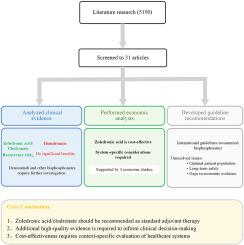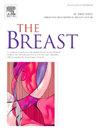Clinical and economic research of bone modifiers as adjuvant therapy for early breast cancer: A systematic literature review
IF 7.9
2区 医学
Q1 OBSTETRICS & GYNECOLOGY
引用次数: 0
Abstract
Background
Adjuvant bisphosphonate therapy is recommended by some guidelines for postmenopausal breast cancer, but its application is not ideal due to inconsistent study results and economic burden considerations. This review aims to provide a comprehensive overview of bone modifiers in breast cancer adjuvant treatment to inform clinical practice and health policy.
Methods
PubMed, Embase, Cochrane Library, and Web of Science were searched using terms related to bone modifiers and breast cancer. The included studies comprised clinical trials evaluating adjuvant bone modifiers in early breast cancer (EBC) that reported recurrence, metastasis, or survival outcomes, as well as economic studies that reported costs and effects. Quality was assessed using Cochrane Risk of Bias tool and Quality of Health Economic Studies scale. We also summarized current international guideline recommendations regarding adjuvant bone modifiers in EBC.
Results
Of the 31 eligible articles, findings showed that zoledronic acid and clodronate demonstrated reduced recurrence and improved survival in low-estrogen EBC patients, whereas ibandronate showed no significant benefit. Other bisphosphonates and denosumab require further investigation. Bone modifiers were generally well-tolerated, with mild adverse events. Serious events like nephrotoxicity, osteonecrosis of the jaw, and atypical femoral fractures were rare but necessitate monitoring and prevention. Economic studies suggest that adjuvant zoledronic acid may be cost-effective for postmenopausal EBC patients.
Conclusion
Many unresolved issues remain regarding bone modifiers in EBC adjuvant therapy. Insufficient clinical and economic evidence precludes drawing comprehensive conclusions at present. Future studies need to provide higher-quality evidence to deepen our understanding of adjuvant therapy with bone modifiers.

骨调节剂作为早期乳腺癌辅助治疗的临床和经济研究:系统文献综述
一些指南推荐双膦酸盐辅助治疗绝经后乳腺癌,但由于研究结果不一致和经济负担的考虑,其应用并不理想。本综述旨在全面概述骨调节剂在乳腺癌辅助治疗中的应用,为临床实践和卫生政策提供参考。方法检索spubmed、Embase、Cochrane Library和Web of Science中与骨修饰剂和乳腺癌相关的词汇。纳入的研究包括评估早期乳腺癌(EBC)中辅助骨调节剂的临床试验,这些临床试验报告了复发、转移或生存结果,以及报告了成本和效果的经济学研究。质量评估采用Cochrane偏倚风险工具和健康经济研究质量量表。我们还总结了目前关于EBC中辅助骨调节剂的国际指南建议。在31篇符合条件的文章中,研究结果显示唑来膦酸和氯膦酸可减少低雌激素EBC患者的复发和改善生存,而依班膦酸没有明显的益处。其他双膦酸盐和denosumab需要进一步研究。骨调节剂通常耐受性良好,不良事件轻微。肾毒性、颌骨骨坏死和非典型股骨骨折等严重事件罕见,但需要监测和预防。经济学研究表明佐剂唑来膦酸对绝经后EBC患者可能具有成本效益。结论骨调节剂在EBC辅助治疗中仍有许多未解决的问题。临床和经济证据不足,目前无法得出全面的结论。未来的研究需要提供更高质量的证据来加深我们对骨调节剂辅助治疗的理解。
本文章由计算机程序翻译,如有差异,请以英文原文为准。
求助全文
约1分钟内获得全文
求助全文
来源期刊

Breast
医学-妇产科学
CiteScore
8.70
自引率
2.60%
发文量
165
审稿时长
59 days
期刊介绍:
The Breast is an international, multidisciplinary journal for researchers and clinicians, which focuses on translational and clinical research for the advancement of breast cancer prevention, diagnosis and treatment of all stages.
 求助内容:
求助内容: 应助结果提醒方式:
应助结果提醒方式:


